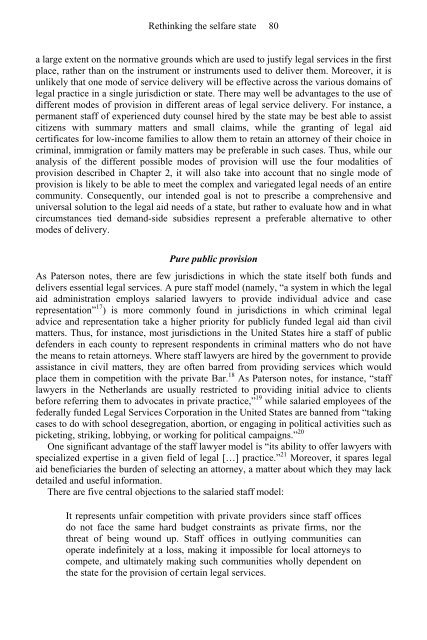Rethinking the Welfare State: The prospects for ... - e-Library
Rethinking the Welfare State: The prospects for ... - e-Library
Rethinking the Welfare State: The prospects for ... - e-Library
Create successful ePaper yourself
Turn your PDF publications into a flip-book with our unique Google optimized e-Paper software.
<strong>Rethinking</strong> <strong>the</strong> selfare state 80<br />
a large extent on <strong>the</strong> normative grounds which are used to justify legal services in <strong>the</strong> first<br />
place, ra<strong>the</strong>r than on <strong>the</strong> instrument or instruments used to deliver <strong>the</strong>m. Moreover, it is<br />
unlikely that one mode of service delivery will be effective across <strong>the</strong> various domains of<br />
legal practice in a single jurisdiction or state. <strong>The</strong>re may well be advantages to <strong>the</strong> use of<br />
different modes of provision in different areas of legal service delivery. For instance, a<br />
permanent staff of experienced duty counsel hired by <strong>the</strong> state may be best able to assist<br />
citizens with summary matters and small claims, while <strong>the</strong> granting of legal aid<br />
certificates <strong>for</strong> low-income families to allow <strong>the</strong>m to retain an attorney of <strong>the</strong>ir choice in<br />
criminal, immigration or family matters may be preferable in such cases. Thus, while our<br />
analysis of <strong>the</strong> different possible modes of provision will use <strong>the</strong> four modalities of<br />
provision described in Chapter 2, it will also take into account that no single mode of<br />
provision is likely to be able to meet <strong>the</strong> complex and variegated legal needs of an entire<br />
community. Consequently, our intended goal is not to prescribe a comprehensive and<br />
universal solution to <strong>the</strong> legal aid needs of a state, but ra<strong>the</strong>r to evaluate how and in what<br />
circumstances tied demand-side subsidies represent a preferable alternative to o<strong>the</strong>r<br />
modes of delivery.<br />
Pure public provision<br />
As Paterson notes, <strong>the</strong>re are few jurisdictions in which <strong>the</strong> state itself both funds and<br />
delivers essential legal services. A pure staff model (namely, “a system in which <strong>the</strong> legal<br />
aid administration employs salaried lawyers to provide individual advice and case<br />
representation” 17 ) is more commonly found in jurisdictions in which criminal legal<br />
advice and representation take a higher priority <strong>for</strong> publicly funded legal aid than civil<br />
matters. Thus, <strong>for</strong> instance, most jurisdictions in <strong>the</strong> United <strong>State</strong>s hire a staff of public<br />
defenders in each county to represent respondents in criminal matters who do not have<br />
<strong>the</strong> means to retain attorneys. Where staff lawyers are hired by <strong>the</strong> government to provide<br />
assistance in civil matters, <strong>the</strong>y are often barred from providing services which would<br />
place <strong>the</strong>m in competition with <strong>the</strong> private Bar. 18 As Paterson notes, <strong>for</strong> instance, “staff<br />
lawyers in <strong>the</strong> Ne<strong>the</strong>rlands are usually restricted to providing initial advice to clients<br />
be<strong>for</strong>e referring <strong>the</strong>m to advocates in private practice,” 19 while salaried employees of <strong>the</strong><br />
federally funded Legal Services Corporation in <strong>the</strong> United <strong>State</strong>s are banned from “taking<br />
cases to do with school desegregation, abortion, or engaging in political activities such as<br />
picketing, striking, lobbying, or working <strong>for</strong> political campaigns.” 20<br />
One significant advantage of <strong>the</strong> staff lawyer model is “its ability to offer lawyers with<br />
specialized expertise in a given field of legal […] practice.” 21 Moreover, it spares legal<br />
aid beneficiaries <strong>the</strong> burden of selecting an attorney, a matter about which <strong>the</strong>y may lack<br />
detailed and useful in<strong>for</strong>mation.<br />
<strong>The</strong>re are five central objections to <strong>the</strong> salaried staff model:<br />
It represents unfair competition with private providers since staff offices<br />
do not face <strong>the</strong> same hard budget constraints as private firms, nor <strong>the</strong><br />
threat of being wound up. Staff offices in outlying communities can<br />
operate indefinitely at a loss, making it impossible <strong>for</strong> local attorneys to<br />
compete, and ultimately making such communities wholly dependent on<br />
<strong>the</strong> state <strong>for</strong> <strong>the</strong> provision of certain legal services.


